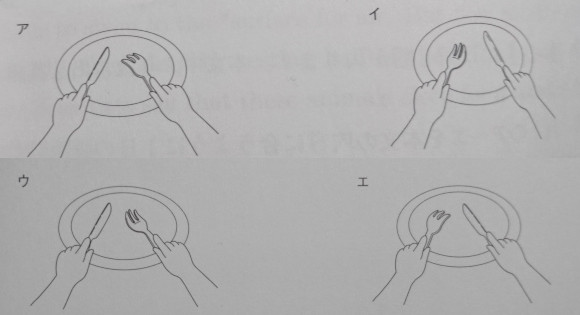中学英語の問題演習
主格の関係代名詞
※( )内の高校の入試問題で出題された問題です。(すべて全角カタカナで入力すること)
次のそれぞれの文について、意味が通じるように( )をうめるのに最も適切なものを一つずつ選び、記号で答えなさい。
(1)I remember the nurse ( ) took care of me at the hospital.
(栃木県公立高校入試)
ア when イ who
ウ why エ which
(2)I found some books ( ) tell us about the earth.
(佐賀・東明館)
ア which イ whose
ウ who エ whom
(3)This is the train ( ) to the station.
(大阪偕星学園)
ア who go イ which go
ウ who goes エ which goes
文章の主題の把握
※東海大学付属福岡高校の入試問題です。(すべて全角カタカナで入力すること)
次の英文を読み、以下の問いに答えなさい。
When some Japanese people eat Western food, they put rice on the back of the fork to eat it. Americans and most Europeans don't have this custom. Why do Japanese eat rice in this way?
This strange way of using a fork was introduced to Japan in the Meiji period. When Western food was introduced to the country, Japanese were taught to hold the knife in the right hand and the fork in the left, and to turn the back of the fork upward.
The Japanese thought that they had to always keep ①this position during the meal. Even when they were eating rice, they didn't turn over the fork. They put rice on the back of the fork. So they believed it was the correct way to eat Western food.
Also, many Japanese have an interesting way of eating spaghetti. They put it on a spoon and spin it around with a fork. But this is not done when Italians eat spaghetti.
※
custom 習慣
Meiji period 明治時代
upward 上の方へ
correct 正しい
spaghetti スパゲッティ
spin まわす
問1 ①this positionの内容に相当する絵を次のア~エのうちから1つ選び、記号で答えなさい。

問2 本文の内容と一致するものを下のア~オのうちから1つ選び、記号で答えなさい。
ア Putting rice on the back of the fork to eat was introduced in American cook books.
イ Americans and most Europeans put rice on the back of the fork to eat.
ウ Japanese put spaghetti on a spoon and spin it around with a fork when they eat.
エ Japanese learned how to eat spaghetti when the Americans came to Japan.
オ People living in Italy don't eat spaghetti.
問3 本文の内容のタイトルとして最も適切なものを下のア~エのうちから1つ選び、記号で答えなさい。
ア Japanese Food Introduced in America
イ Japanese Food in the Meiji Period
ウ A Unique Table Manner
エ Western Food and American Food
was/wereと過去進行形
※( )内の高校の入試問題を参考に作られています。(すべて半角で入力し、文頭は大文字で書き始めること)
日本語が与えられているものはその意味をあらわす英文になるように、与えられていないものは意味が通る英文になるように、( )に1語ずつ入れなさい。なお、日本語が与えられていないものについては、be動詞が入ります。
(1)(石川・金沢工業高専)
Tom and I ( ) students at New York University three years ago.
(2)(兵庫・関西学院)
( ) you a member of the group last year?
― Yes, I ( ).
(3)(広島・如水館)
今朝は寒くありませんでした。
( ) ( ) not cold this morning.
(4)(茨城・茗溪学園)
彼はその店の前で、彼女を待っていました。
He was ( ) ( ) her in front of the shop.
指示語の内容理解
※近畿大学泉州高校の入試問題を参考に作られています。(答えを入力する問題ではすべて半角アルファベットで入力すること)
次のシンガポールを旅行中の真司と現地の女性との対話の一部を読んで、後の問いに答えなさい。
Woman:Excuse me, are you a tourist? Please stop drinking.
Shinji:Why? It's very hot today, so I just want to drink this water.
Woman:You can't eat or drink on the train. If you ①do so, you have to pay money. In Singapore, we have our own rules.
Shinji:Oh, I didn't know that.
Woman:②You (just/one/the rules/learned/of/have).
Shinji:Yes. Thank you very much. What other rules do you have?
Woman:For example, we can't pick flowers, or give food to birds in the park. If you do ③those things in Singapore, ④you will be *fined.
Shinji:Umm……. I think the rules are very *strict.
Woman:You're right, but we *accept them, and try to make a more beautiful country. We want many foreign people to come here.
Shinji:I see. People in Singapore really love this beautiful country.
注
*fine 罰金を払う
*strict 厳しい
*accept 受け入れる
問1 下線部①の指す内容を日本語で答えなさい。
問2 下線部②の( )内の語句を次の日本文に合うよう並べかえなさい。
「あなたは規則の一つを学びました。」
問3 下線部③の内容を2つ日本語で答えなさい。
問4 下線部④とほぼ同じ意味の表現を文中より抜き出し、空所に適語を入れなさい。
問5 次の質問に日本語で答えなさい。
Why do people in Singapore try to keep their own rules?
命令文
※( )内の高校の入試問題を参考に作られています。(答えはすべて半角で入力し、文頭は大文字で書き始めること。文末にはピリオドを打つこと。)
次のような場合、英語では相手にどのように言いますか。( )内の語に不足する1語を加え、正しく並べかえなさい。
(1)(静岡県公立高校入試)
戸を閉めてと頼む場合。
(door/close/the)
(2)(高知県公立高校入試)
ここで野球をしてはいけないと禁止する場合。
(baseball/play/here)
(3)(広島県公立高校入試)
今日の午後バレーボールをしようと誘う場合。
(volleyball/this/play/afternoon)
